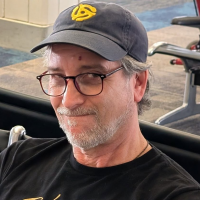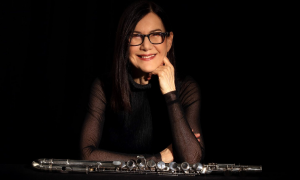Home » Jazz Articles » Interview » Souvik Dutta: 20 Years of Abstract Logix
Souvik Dutta: 20 Years of Abstract Logix

Courtesy Palani Mohan
It feels kind of strange when folks say I help musicians. I look at it as the other way around. I feel privileged to be around brilliant musicians, their creativity and the joy that universe brings.
—Souvik Dutta

John McLaughlin
guitarb.1942

Shakti
band / ensemble / orchestrab.1974

Zakir Hussain
tablas1951 - 2024

Jimmy Herring
guitarb.1962

Wayne Krantz
guitar, electric
Gary Husband
drumsb.1960

Scott Kinsey
keyboards
Gary Willis
bassb.1957

Oz Noy
guitarIt's also quite possible you may have even encountered him as well. Along the way to adding Grammy-winning producer to his credits, he has also donned many other hats, not only managing and booking his artists and tours, but everything else from staging festivals to working merch tables and even taking phone orders for releases on the Abstract Logix site during the early days.
But even if you have never crossed paths with Souvik Dutta, if you are a music lover, you know him—because he is one too. That's why the driving force of his enterprise is not financial but stems from a pure love of music and an enthusiasm to foster it. This may indeed seem at odds with today's entrepreneurial mindset, but the impressive trajectory and body of work Abstract Logix has attained seems to show just how impactful the altruistic motivations of an affable and inadvertent impresario may have been to the artistic ecosystem as a whole—(and why it's worth getting to know him a little better).
All About Jazz sat down with Souvik Dutta via Zoom in the Spring and Summer of 2024.
All About Jazz: Tell a little about your upbringing. What part of India do you hail from?
Souvik Dutta: I was born in Calcutta in Eastern India, a major city with over 15 million people. When I was growing up in the '80s, it was better known around the world as the home of Mother Teresa. Amazing music and creativity in various forms like film and literature have originated from that part of the world. The culture and the vibe generally lean towards a slower pace compared to the rest of the country.
There was a period in the '70s and '80s where acceptance and acclaim in Calcutta was almost a pre-requisite to being called a successful Indian classical musician. Legends like Pandit

Ravi Shankar
sitar1920 - 2012
AAJ: Were you from a musical family?
SD: Both my parents were regular professionals, but like many Calcuttans, they had a fondness for Indian classical music and spent a considerable amount of time learning and living it. I have fond memories of my folks having jam sessions with their friends at home. They did this once or twice a week for several years. My dad told me recently that I had this uncanny ability to pick the songs they were performing at that moment out of their songbook. I don't quite remember doing it though [laughs]. I have vivid memories of being surrounded by music all the time, whether at home, concerts or just social gatherings.
MTV arrived in Calcutta a few years later than it did in other places in the '80s. But the American or British music that I was exposed to mostly came via bootleg tapes, or friends of friends bringing it over from London or New York. You could visit an area frequented by Western travelers called Free School Street, where some would bring music from their country and sell it to local shops. You could walk around and find a great selection of rock, jazz, blues, African, big band music, original pressings, and Japanese imports.
Most importantly, there was a hip scene of local musicians and bands who introduced us to contemporary Western music through their shows. Getting to hear some of that classic music live, even by cover bands, was a thrill. The spirit and the intent were very much there, at least enough to stoke interest in a young person growing up in the city.
AAJ: Do you recall what your first exposures to Western music were?
SD: If memory serves me right, it was ABBA. My mom liked them too. Also Boney M, who were a British R&B and disco band. They were quite the rage in urban India at the time. Then there was

Jimi Hendrix
guitar, electric1942 - 1970

Pink Floyd
band / ensemble / orchestrab.1964
In '84, Shakti came to Calcutta. I knew who Zakir Hussain was then, but I knew nothing about Shakti. Don't forget, being eleven, I was still quite young. Zakir-Bhai was already a very well-known national personality, as was his father, Ustad

Alla Rakha
percussion1919 - 2000
AAJ: Is that how John McLaughlin first got on your radar?
SD: What radar? I was 11 years old! [laughs]. But yes, that was the first I heard about him. To be honest, I was more into sports than music at the time, but I do remember there was a big buzz around Shakti coming to our city and I kind of remember my cousins and their friends being really excited about a special night out on the town. Even years later, people would still recall that '84 Shakti tour of India.
AAJ: So, as a youngster, did that turn the tide for you from sports to music?
SD: No, the credit for that must go to my parents. Because they were so into music, they wanted me to have some kind of formal musical instruction at home; and that was a beautiful thing they did for me. They placed me under a wonderful local gentleman, a sitar player. I spent 3 or 4 years studying under him and got introduced to Indian classical music.
Soon after that, I also got into rock and pop music of the time:

Led Zeppelin
band / ensemble / orchestrab.1968

Jeff Beck
guitar1944 - 2023

Cream
band / ensemble / orchestraThe Yardbirds
band / ensemble / orchestra
Michael Jackson
vocals1958 - 2009
Dire Straits
band / ensemble / orchestra1977 - 1995

Peter Gabriel
vocalsb.1950

Sting
bass, electricb.1951
 "
data-original-title="" title="">Level 42, and on and on. The '80s were a great period for pop music, and an incredibly rich time for a young music lover to be growing up.
"
data-original-title="" title="">Level 42, and on and on. The '80s were a great period for pop music, and an incredibly rich time for a young music lover to be growing up. I took some bass lessons and played in high school bands. I think it was through my teacher, Lew Hilt, that I got hipped to the music of The

Mahavishnu Orchestra
band / ensemble / orchestrab.1971

Steely Dan
band / ensemble / orchestrab.1972

Little Feat
band / ensemble / orchestrab.1969
By the time I came over to the States to go to university, my big attraction was getting to see some of this music live. Remember, there was still no internet in 1991—we had no exposure to music beyond what we could get locally via a small bit of TV.
I cannot help but smile when I think of those early days: young, fearless and star-gazed... searching for something. America was this entirely mysterious and amazing place: home to Jimi Hendrix, The Allman Brothers, Van Halen, The Grateful Dead, Frank Zappa... I just had to figure out a way to get there and education was the smartest way for me to convince my parents to sanction a move abroad.
I arrived in North Carolina in 1991 and, a month or so later, I was attending gigs with Van Halen, The Allman Brothers, Little Feat,

Dixie Dregs
band / ensemble / orchestra
Santana
band / ensemble / orchestra
Pat Metheny
guitarb.1954
AAJ: Where did you attend university?
SD: I did my undergraduate at Wesleyan University and higher studies at North Carolina State University, close to Raleigh. I took a year and a half off after my sophomore year though and followed The Grateful Dead and many other bands around the country.
That was the first time I got to experience what an American road trip was all about. It was an amazing discovery of life, a true psychological and cultural eye opener. I mean you read about it, you heard about it, but then it takes on a whole new meaning when you live it. Those years helped shape my life.
I returned to school a couple of years later and lived in a farmhouse with friends. We had this reasonably-sized yard where we built a small stage and would invite local bands to stop by. It became a fun, fun thing. I also used to work at a local bar in the evenings and, since it was pretty much run by friends, we created a community music venue out of it. The management loved the crowds every night and we got to have music—a win-win situation for all. We partied like the Merry Pranksters [laughs].
AAJ: What did you do after graduating?
SD: In '97, I moved to Raleigh and started my career in IT. The first few years were just about working my butt off and paying my student loans. I even taught evening classes at a local community college but every time I could, I would go out and see live music. This has always been a great area for all kinds of live music—jazz, bluegrass, rock.
AAJ: So how did the genesis of Abstract Logix come about?
About five years later, at a reunion of close friends, I came up with this crazy idea of having a live band.

Jonas Hellborg
bass
Shawn Lane
guitar, electric1963 - 2003

Jeff Sipe
drumsb.1959
Now I had some basic IT background at the time and since I was already dabbling in video, I thought it would be exciting to have a single-page website that was going to stream a concert out of my living room. Talk about an experience! it was a whole lot of fun, having those legends play at a gig at my home. Looking back, I still can't believe we made that work. [laughs]
By the way, I hope folks take the time to check out the records by Shawn Lane and especially the ones with Jonas. He passed away very early at only 40 years old, relatively unknown and it was and is such a tragedy. He stands as one of the greatest and singular voices on the guitar. We got to spend a reasonable amount of time together during the couple of years I knew him. The tour of India we did in 2003 could be a book or movie unto itself. [laughs]. A beautiful soul too.
AAJ: How did that initial contact with Hellborg and Lane help other things to develop for you?
SD: Well that was a very important weekend. I had international musicians performing in my home and I was getting great emails from people all around the world. At the time, YouTube was not quite that common yet, so having a live video streaming was pretty cool in 2002. That one event established the presence of that website to quite a few fans. As a result, Jonas called me and asked if maybe I could sell a CD via the website. In a way, that was the start of the online retail business.
AAJ: What was that record, by the way?
SD: I think it was Temporal Analogues of Paradise (Day Eight Music, 1996). That record changed my life.
AAJ: So how did having that one record and video evolve into the music clearinghouse?
SD: Well, a lot happened in the next few months. I would usually go out to see live gigs in the area, and it became a routine to take some photos for the website blog. I remember one of the first of these was

Garaj Mahal
band / ensemble / orchestra
Fareed Haque
guitarb.1963

Kai Eckhardt
bass, electricb.1961
Then around Spring of 2003, I found out Shakti was going to do a month-long tour in the States. I was so excited that, in the spur of the moment, I emailed Christian Pegand [John McLaughlin's manager at the time] in Paris to ask his permission to sell records at the gigs [laughs]. He must have been tired of my persistent emails but in the end, he put me in touch with Universal Music Group in New York to ensure I had inventory. With a couple of friends, I rented a minivan and drove around the country selling merchandise.
That was an important time in the evolution of Abstract Logix. I learned a lot being out there on tour and also having the time of my life. Some great connections and lifelong friendships evolved out of that tour that I cherish today.
AAJ: At this point, were you thinking about the site having a stylistic focus or even being a label?
SD: Not yet. This was 2004 and before I thought of having my own record label. I was just organically building relationships with musicians, listeners in the community, industry professionals—just people who found what I was doing interesting via the blog. It started out slow and then it picked up momentum. At the same time, we were expanding our online retail music offering and connecting independent musicians directly with fans. I augmented our content with interviews, reviews, concert listings. Our community was growing, and we went from selling a record every three days to 30 records a week. The income from the Shakti tour helped fund the expansion of the website into a sophisticated e-commerce and engagement platform, connecting fans with musicians and labels . Another pivotal moment was when John McLaughlin called me out of the blue, which led to me distributing his three-disc educational DVD called This is the Way I Do It. We had met each other the previous year during the Shakti tour, and he found out that I had a day gig working in tech. He asked me to set up an online shop to securely take orders. That opened the world of John McLaughlin fans and guitar fans to Abstract Logix and things really started to take off after that.
AAJ: So what was the first step towards Abstract Logix becoming a record label?
SD: Well, later that same year, Jeff Sipe, with whom I kept in touch with, introduced me to guitarist Jimmy Herring over the phone. Now I've been a die-hard Aquarium Rescue Unit fan since I moved to North Carolina in the '90s and had always loved Herring's playing with

Phil Lesh
bass, electric1940 - 2024

Jazz Is Dead
band / ensemble / orchestra
Oteil Burbridge
bassb.1967
A few weeks later, Jimmy and I met again in Raleigh about the
Project Z
band / ensemble / orchestraAAJ: It is an amazing record but it has a formlessness and abandon that certainly makes it something no "normal" record executive would want to go near.
SD: But that is exactly what I like—craziness and anarchy. I must have been a last resort for Herring and Sipe, but I bought it because it was right up my alley and frankly, no one had ever offered to sell me a record [laughs].
Also, right around that same time, I met

Alex Machacek
guitar, electric
Terry Bozzio
drumsb.1950
Anyway, all those exciting things were happening in my little musical universe. Distributing records, running an e-commerce operation, building a music community, going on the road with John McLaughlin. Then it was like, "Wow, maybe I should start my own record label with all these great artists." Not that I even knew what that really meant.
Jonas Hellborg put me in touch with City Hall Records in San Rafael and from then on, things just started to coalesce: Scott Kinsey and Gary Willis from Tribal Tech,

Tony Grey
bass, electricb.1975

Lenny White
drumsb.1949
AAJ: It seems amazing that you were able to hold down your day gig while all this was going on.
SD: I was lucky in the sense that I was already able to work remotely to a large degree, even back then. Since I was never in a traditional office, working remotely from anywhere on the road or at home equated to the same thing. I got good at multi-tasking on stage or over a conference call. The more I think about it now, I can't believe how I managed it all [laughs]. it must have been youth [laughs].
In those early days of the label, John McLaughlin was recording Floating Point (Abstract Logix, 2008) in India. I went and met him and, seeing that I had a formal label and was already distributing his DVD, he asked me about releasing his new album. I said, "I'll do my best, Sir." [laughs]. I mean, am I going to say no to my musical hero?
See, here's the thing: I am one of the guys who says "Yes" in life when I should probably say "No." But I jump off the cliff, work my ass off and hope the stars align in my favor. I am lucky that most things have worked out. It seems that at these kinds of inflection points, I tend to go out on a limb and hope the stars align.
AAJ: So people were bringing you projects and records to put out but at a certain point, you also started to put projects together yourself, bringing together musicians that had never recorded together—similar to what Mike Varney was doing on his Tone Center label.
SD: That started early with Improvision (Abstract Logix, 2007), which was the seventh record on the label. I was friends with Jeff Sipe and Alex Machacek by then, and I also met bassist

Matt Garrison
saxophoneAAJ: Evidently, your wife said yes.
SD: Yeah [laughs], that weekend, they all came to my house and had a snack in the evening. Being aware of each other as musicians but never having met, then we went down to a club where Sipe's brother-in-law, Mikey, was the bartender. They had given us the place for the three of them to play together for the first time—cold. They went in with blind trust in me and each other and man, it was incredible! I remember a smoking version of "Teen Town." The next day we went to shitty studio in Raleigh—we didn't know at the time that it had a defective board—and they improvised for two days. Then Alex brought these sonically defective tracks home and re-engineered them into what became the Improvision album. When I say re-engineered, I'm saying he supplementally recorded single notes from Matt Garrison and all kinds of individual drum and cymbal hits from Sipe so he could go in and reconstruct the recording. The tracks from the studio were riddled with distortion and were unusable. What he did was amazing! Alex has phenomenal patience and great engineering skills; not to mention his musicality -he is a master.
AAJ: Wow, one might never even suspect.
SD: That's the genius of Alex Machacek. He is such a great producer and editor too.
AAJ: In addition to putting out recordings on your label, you started to book and arrange tours for many of the artists on Abstract Logix. How did you come to take that leap?
SD: That first started with me setting up small tours for Jimmy Herring in the southeast. After his first album Lifeboat (Abstract Logix, 2008) was released, Jimmy couldn't get his agent of choice. He said, "Hey Souvik, if you think you can do it, why don't you give it a try?" So, it was a tour that included stops in Nashville, Atlanta, and of course Raleigh. It must have been around ten dates.
AAJ: By now, you had been on tour with McLaughlin many times. Was it different now being on the other side of things?
SD: It was fun learning about the touring business. That along with my continuing fascination with the whole road trip thing, it felt like I was destined to do it: a hidden force kept me inspired. It took a lot of hard work and sleepless nights, though. [laughs]
The first couple of tours with Jimmy Herring Band had Oteil Burbridge, Scott Kinsey,

Greg Osby
saxophoneb.1960

Matt Slocum
drumsb.1981

Wayne Krantz
guitar, electricThings kept evolving and led to working closely with Gary Husband,

Ranjit Barot
drums
Oz Noy
guitar
Michael Landau
guitar
Rai Thistlethwayte
vocalsAAJ: Well let's talk about 2010 and The New Universe Music Festival you helmed in Raleigh. Even for a two-day festival, it seemed like no mean feat, bringing together all these jazz/rock and fusion artists in one place.
SD: It was another one of those things that I probably shouldn't have done but I went for it and came out alive, feeling fulfilled and amazing [laughs]. The logistics were complicated, and the fact that the two-day festival fell smack in the middle of a John McLaughlin & The 4th Dimension tour that I was also handling made it even more implausible. We had to fly out the next day to Cancun—just crazy. My team in Raleigh buttoned everything down afterward . Lots of beautiful things happened that weekend: musicians connected for the first time, some got reacquainted. All the acts had solid sets; and there was a special tribute to John McLaughlin. Zakir Hussain flew in...
No, it is not common to have John McLaughlin,

Lenny White
drumsb.1949

Anthony Jackson
bass, electricAAJ: Any plans for another festival?
SD: Absolutely. I have been thinking of creating a unique festival or property that brings music and other forms of arts together, bridging cultures, and promoting music via schools in healing and therapy. I don't want to get ahead of myself, but I'm putting some serious thinking into this and need time to sort it out. 2025 is the year I am bringing New Universe festival back and I hope it becomes an annual affair. Wish me luck.
AAJ: Do you have a location in mind?
SD: Honestly, I love the area here in North Carolina where I live. It is hip and people from all walks of life and from all over the world live here. There are great universities and companies around. It is one of the fastest growing areas in America too with a convenient airport. After the Shakti recognition this year, I met a local senator who called me out the blue to congratulate me. Turns out he is a fan of Jimmy Herring and Shakti. I met him and other city officials who are interested in working to bring great events to our area so I'm hopeful to make this a reality.
AAJ: Your wife, Shweta, was a visible presence at the festival in 2010 and has since been credited numerous times on many Abstract Logix releases, including being an executive producer on the Shakti album, This Moment (Abstract Logix, 2023). Would you talk about her role at the label?
SD: We met a couple of years after I started the company and both of us were figuring it out on the job as they say. I spent every available moment thinking about music and artists while she managed logistics, fulfillment, accounting. We also have a core team who has worked with us all this time. We had so much fun working together and putting in a crazy amount of hours.
AAJ: Well, the success of the Shakti 50th anniversary tour and the Grammy for This Moment are things for you both to be proud of. They are also a pretty nice way to mark the 20th anniversary of Abstract Logix. What was it like to win at the Grammys?
SD: We are still pinching ourselves about the entire Shakti tour, the album and the Grammys. That was a rainy day in Los Angeles, the storms rolled in just about when we all congregated at the entrance. There were many musicians and industry members from all walks of life and it was exciting for my wife and I to be with them. We all sat together with our families. Zakir Hussain had just won his first Grammy of the night with

Bela Fleck
banjob.1958
A few minutes later, Shakti won the Grammy for Best Global Music Album. They played "Purple Haze" over the PA and my 20-year journey flashed in my brain. I dreamt in purple as I was filled with a profound sense of love and gratitude. I thanked Mandolin U. Shrinivas and knew he was there in spirit. So was Bruce Hampton and Shawn Lane. John McLaughlin, who was in Portugal for a family reunion, called us within seconds of the announcement as they were all up at night watching it on TV. In the middle of those awful rains, we returned to our hotels and the phones just lit up. Zakir Hussain won three Grammys that night. It was special to see millions of Indians and world music fans elated. Every newspaper and TV channel in India carried the story about Shakti winning at the Grammys. It was a surreal moment.
AAJ: What did it mean to you?
SD: Well, Shakti represents the world I love. That music has been a part of me since I was 10 years old and it had a profound impact on me. I can always turn on that music and it just makes me feel special and takes me somewhere else. I am not sure if I am making any sense but, to me, there has never been anything quite like it.
See, when I was a kid, we had Shakti's Natural Elements (CBS, 1977) on vinyl at home and my father would play it often. That intro to "Mind Ecology" just grabbed me instantly and I could not get over it. I would keep bringing the needle back to play that intro section a hundred times and over many months and years. I still haven't gotten over it. So when I say that all of this must have been written in the stars for me, it feels like the closest explanation I can give.
Music has given me so much in life, I don't even know where to start but I can tell you without any doubt that John McLaughlin changed the course of my life. The fact that he gave me an opportunity when I barely knew anything about the record business is still mind-boggling. I have spent close to twenty years traveling with him across the globe, been to the most amazing places and music festivals, some many times over. I got to see him closely from the side of the stage over a thousand times, immersed in music. His incredible discipline in life and in music is something we all aspired to. On some nights when he was on fire, he was floating.
I met so many musicians and heroes of mine because of him but most importantly, the die-hard fans everywhere. All those who stood outside for hours to get him to sign their vinyl—I saw myself in them everywhere. We are all universal in music. I can never overstate his profound impact on me and my family. Serious life lessons which stay with me everyday in life. Friends have asked me to write a book about this. Maybe I should hurry up before I forget the details. These dying brain cells... [laughs]
AAJ: 20 years on, when you look at Abstract Logix and its catalog, what do you see?
SD: Well, I didn't have a plan, and I wasn't coming from the music business so in a sense I was free to be creative and experimental. The catalog is reflection of my taste and some of the music I love. I would have loved to work with many other great musicians but either they were already working with others, or we never crossed paths. But in my little orbit, I had access to wonderful artists, and they had access to me
AAJ: Well, you have created a sort of hallmark for yourself and the label—one that denotes eclecticism but also top-tier musicianship.
SD: Well thanks. Whether it's your cup of tea or not, the catalog represents some of the greatest musicians telling their life stories. I am just happy to play a small role in making it possible.
I have been lucky to be able to keep music as the number one priority. Everything else came after and I would not have wanted to do this any other way. It feels kind of strange when folks say I help musicians. I look at it as the other way around. I feel privileged to be around brilliant musicians, their creativity and the joy that universe brings. . For myself and other music fanatics, we understand deeply the gift music keeps giving us. It is unexplainable. After a great concert or listening to a new record, when strangers share the profound impact that the music had on them, it makes everything worth it—all the hard work you put in and the bullshit that comes with the business. I am a fan just like them. Music is magic and I will always be a part of it in one way or the other till I disappear into the abyss.
Tags
Interview
Mike Jacobs
john mclaughlin
Shakti,
Zakir Hussain
Jimmy Herring
Col. Bruce Hampton
Wayne Krantz
Gary Husband
Scott Kinsey
Gary Willis
Oz Noy
Ravi Shankar
Vilayat Khan
Ali Akbar Khan
ABBA
Boney M.
Jimi Hendrix
The Beatles
Pink Floyd
Alla Rakha
Led Zeppelin
The Allman Brothers
jeff beck
Cream
The Eagles
The Yardbirds
Van Halen
Michael Jackson
Prince
Dire Straits
Peter Gabriel
Sting
Level 42
Mahavishnu Orchestra
steely dan
Little Feat
The Grateful Dead
Frank Zappa
Dixie Dregs
Santana
pat metheny
Jonas Hellborg
Shawn Lane
Jeff Sipe
Garaj Mahal
Fareed Haque
Kai Eckhardt
Aquarium Rescue Unit
Phil Lesh
Jazz is Dead
Alex Machacek
Tony Grey
Lenny White
Matt Garrison
Oteil Burbridge
Greg Osby
Neal Fountain
Matt Slocum
Ranjit Barot
Michael Landau
Ozone Squeeze
Rai Thistlethwayte
Anthony Jackson
Bela Fleck
Comments
PREVIOUS / NEXT
Support All About Jazz
 All About Jazz has been a pillar of jazz since 1995, championing it as an art form and, more importantly, supporting the musicians who make it. Our enduring commitment has made "AAJ" one of the most culturally important websites of its kind, read by hundreds of thousands of fans, musicians and industry figures every month.
All About Jazz has been a pillar of jazz since 1995, championing it as an art form and, more importantly, supporting the musicians who make it. Our enduring commitment has made "AAJ" one of the most culturally important websites of its kind, read by hundreds of thousands of fans, musicians and industry figures every month.







 Buy Now
Buy Now





















